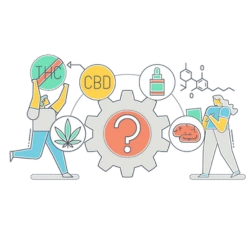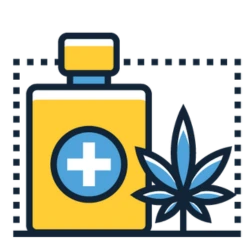
South Carolina is a hotspot of CBD and cannabis innovation. This year, a “cannabis dry bar” opened in the state to serve customers a range of THC and CBD-infused drinks, including seltzers, cocktails, and other CBD goods.[1]Eater Carolinas. “A Sneak Peek at South Carolina’s First ‘Cannabis Dry Bar’“. Accessed March 1, 2024. This is just one of the many examples of CBD entrepreneurialism in the state, showcasing the thriving market for CBD businesses without the need for a specific CBD license in South Carolina for retail operations.
However, understanding licensing requirements and local regulations is crucial before starting a CBD business in South Carolina. The state has specific rules governing CBD product cultivation, processing, and sale. Complying with these regulations ensures your business stays active without penalty. Additionally, staying informed about evolving industry standards and local ordinances can help business owners adapt to changing market conditions, which remains essential as the broader CBD industry continues to evolve in the United States.
This guide explores how to start a CBD business in South Carolina, how to obtain CBD licenses in South Carolina, the rules and regulations for selling CBD products in South Carolina, how to renew your South Carolina CBD license, and other related topics.
How to Start a CBD Business in South Carolina
The first step in starting any business is deciding on its structure. CBD entrepreneurs in South Carolina often choose Limited Liability Companies (LLCs) for their business structures due to their advantages, including personal liability protection, simplified taxation, and flexibility in management. This structure shields their personal assets from business debts, simplifies tax reporting, and allows for adaptable management, making it an attractive choice for those seeking legal protection and operational flexibility in the rapidly evolving CBD industry. However, you can also choose a Limited Partnership (LP), sole proprietorship, or a range of other business structures.
You can access the filing portal on the South Carolina Secretary of State website. Once your business is registered, you can apply for an Employer Identification Number (EIN) from the IRS. An EIN is used to identify a business entity for tax, financial, and legal purposes, separating it from personal finances and enabling compliance. It also makes it possible to employ staff members.
Next, don’t forget to open a business bank account. New business owners should open business bank accounts early on to keep personal and business finances separate, look more professional, stay on the right side of the law, and manage money easily. It also safeguards personal assets and helps establish a business credit score.
Following the above-mentioned steps lays a solid foundation for a new business, but you must still consider the CBD-specific requirements of starting a new company in South Carolina. Let’s explore this in more detail in the section below!
How to get a CBD License in South Carolina
South Carolina does not require a retail CBD license, meaning there’s no need to complete any applications or pay fees to start selling CBD products to customers, provided the products are legal.
However, those wishing to farm or process hemp for CBD products must obtain a license from the South Carolina Department of Agriculture (SCDA). Similarly, individuals looking to handle hemp need to apply for a handler’s license. There are several types of hemp handler licenses available:
- Warehouse/Storage/Drying Facility
- Transporter
- Laboratory
- Seed Dealer/Supplier
- Other (Broker, R&D, Sales Rep)
You can find all hemp-related licensing information and applications on the SCDA website. Hemp processor and hemp handler license applications are accepted year-round, whereas hemp farmer applications have a deadline (for 2023, the deadline was February 28th).

CBD License Application Requirements for South Carolina
There is no CBD license for retailers selling CBD in South Carolina, so there are no application requirements. However, for businesses applying for hemp licenses, the requirements vary depending on the type of license you apply for. Below, let’s explore some of the core details required for hemp licenses in South Carolina:
- Personal details of the individual applicant
- Details of the business applying for the permit
- A brief business plan
- Information about the purpose of your business’s hemp cultivation or processing
- List of businesses or farmers your business is affiliated with (if there are any)
- GPS locations of fields
- Background checks for all applicants
The details required by the application will vary depending on the type of hemp license. Explore all the details on the SCDA website before starting your application.
Laws & Regulations for Selling CBD in South Carolina
South Carolina’s lack of retail CBD licensing requirements simplifies market entry, reduces bureaucratic hurdles, and encourages entrepreneurship, fostering a more accessible and dynamic CBD retail landscape in the state. However, this doesn’t mean there aren’t a few rules and regulations your business must follow when selling CBD products in South Carolina.
For CBD products to be legal in South Carolina, they must be derived from hemp, meaning they must have 0.3% THC concentration or less. Likewise, CBD products cannot be food due to FDA regulations prohibiting CBD from being added to food products (though this may change in the future).
Additionally, many states, including South Carolina, are currently struggling to manage cannabidiol suppliers using CBD products as a means for creating psychoactive substances. CBD products containing Delta-8 THC are used to bypass restrictions and create cannabis-like products without conforming to any cannabis regulations. However, some police departments, such as Columbia Police Department in South Carolina, are now calling the product illegal.[2]WIS10. “CPD letter calls Delta 8 illegal, leaving the future uncertain for hemp stores“. Accessed March 1, 2024. Stay on top of any developments to ensure all your CBD products comply with South Carolina law.
How to Renew Your CBD License in South Carolina
As there are no licensing requirements for South Carolina CBD retailers, there’s no need to renew any CBD licenses. However, hemp licenses require annual renewal. Businesses can renew their hemp licenses by heading to the SCDA hemp website and following instructions. Licenses expire one year from the date of issuance. Do not allow your licenses to expire if you want to farm, process, or handle hemp legally!
Start Selling CBD in South Carolina

Opening a CBD business in South Carolina is lucrative due to the growing acceptance of CBD products, a receptive consumer base seeking natural wellness alternatives, and favorable state regulations.
However, deciding how to market and sell CBD products to your customers is essential. Starting an online CBD business in South Carolina offers a broader reach, lower overhead costs, and the ability to target a wider customer base. It’s ideal for scalability and convenience. Conversely, an in-person CBD business provides face-to-face customer engagement, local community support, and immediate credibility. The choice depends on your marketing strategy, budget, and preference for online or physical interaction. Many entrepreneurs opt for a hybrid approach to maximize benefits by combining online and in-person presence for a well-rounded business strategy.
A high-risk merchant account is essential for a CBD business in South Carolina due to the industry’s perceived risk. It offers benefits such as reliable payment processing, reduced risk of account closures, and enhanced fraud protection. Likewise, many high-risk merchant account providers offer CBD-specific features, making it more straightforward for cannabidiol entrepreneurs to access the necessary payment tools. So, what are you waiting for? Contact a high-risk merchant service provider today to begin accepting CBD payments in South Carolina!
CBD Businesses Wanted!
We help businesses that would normally get turned away.
Approval
Rating
South Carolina CBD License: FAQs
Is CBD legal in South Carolina?
Yes. CBD is legal in South Carolina. However, to remain compliant with local and federal CBD rules, all CBD products must contain 0.3% THC concentration or less. However, there are currently efforts to change laws regarding CBD products with delta-8 and delta-10 THC, as these substances can be psychoactive. Remember to remain wary of any future changes to CBD laws to ensure your business doesn’t market illegal products.
How much does a CBD license cost in South Carolina?
It doesn’t cost any money to sell CBD products to consumers in South Carolina, as retailers have no licensing requirements. However, hemp licenses have associated application fees and annual fees. The cost varies depending on the type of hemp license your business requires and the number of locations you operate.
Can you sell CBD without a license in South Carolina?
Yes. Your business can sell CBD products without a license in South Carolina — retail CBD locations are not regulated by the South Carolina Department of Agriculture (SCDA).[3]South Carolina Department of Agriculture. “Hemp“. Accessed March 1, 2024. However, businesses growing, handling, or processing hemp for CBD products require a hemp license.
How long is a CBD license valid in South Carolina?
There are no South Carolina CBD licenses for selling legal cannabidiol products, so retailers don’t need to worry about expiry dates or license renewals. However, hemp licenses must be renewed annually — they expire one year after the date of issuance.




